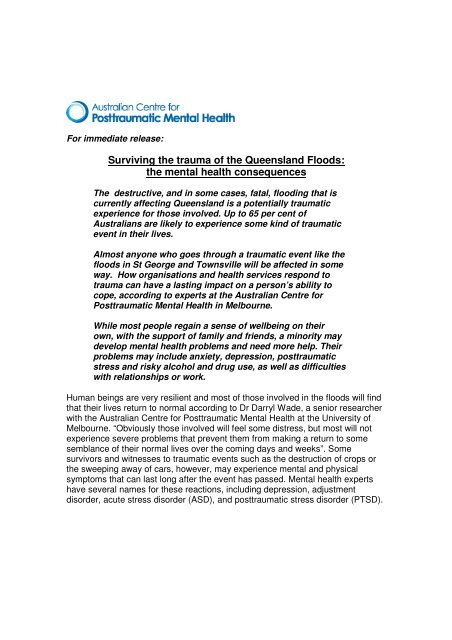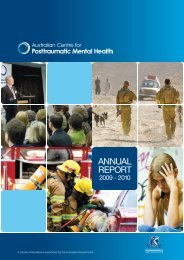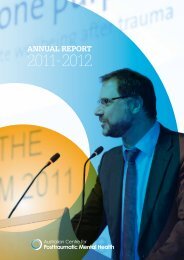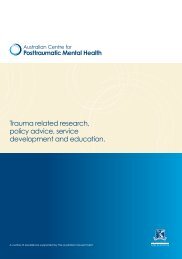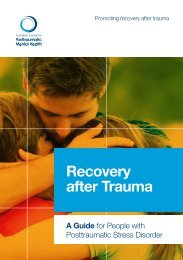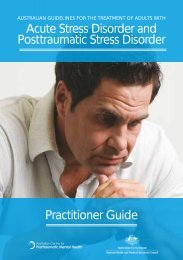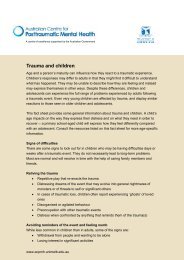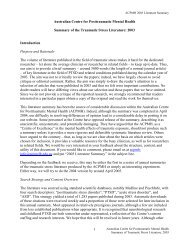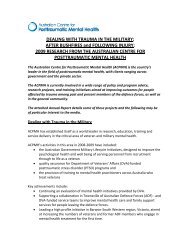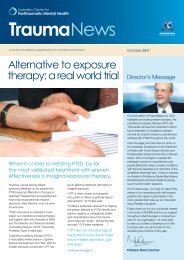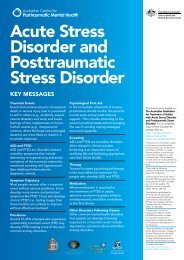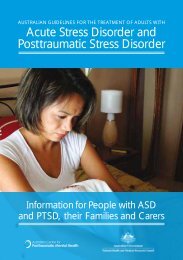Surviving the trauma of the Queensland Floods - Australian Centre ...
Surviving the trauma of the Queensland Floods - Australian Centre ...
Surviving the trauma of the Queensland Floods - Australian Centre ...
You also want an ePaper? Increase the reach of your titles
YUMPU automatically turns print PDFs into web optimized ePapers that Google loves.
For immediate release:<strong>Surviving</strong> <strong>the</strong> <strong>trauma</strong> <strong>of</strong> <strong>the</strong> <strong>Queensland</strong> <strong>Floods</strong>:<strong>the</strong> mental health consequencesThe destructive, and in some cases, fatal, flooding that iscurrently affecting <strong>Queensland</strong> is a potentially <strong>trauma</strong>ticexperience for those involved. Up to 65 per cent <strong>of</strong><strong>Australian</strong>s are likely to experience some kind <strong>of</strong> <strong>trauma</strong>ticevent in <strong>the</strong>ir lives.Almost anyone who goes through a <strong>trauma</strong>tic event like <strong>the</strong>floods in St George and Townsville will be affected in someway. How organisations and health services respond to<strong>trauma</strong> can have a lasting impact on a person’s ability tocope, according to experts at <strong>the</strong> <strong>Australian</strong> <strong>Centre</strong> forPost<strong>trauma</strong>tic Mental Health in Melbourne.While most people regain a sense <strong>of</strong> wellbeing on <strong>the</strong>irown, with <strong>the</strong> support <strong>of</strong> family and friends, a minority maydevelop mental health problems and need more help. Theirproblems may include anxiety, depression, post<strong>trauma</strong>ticstress and risky alcohol and drug use, as well as difficultieswith relationships or work.Human beings are very resilient and most <strong>of</strong> those involved in <strong>the</strong> floods will findthat <strong>the</strong>ir lives return to normal according to Dr Darryl Wade, a senior researcherwith <strong>the</strong> <strong>Australian</strong> <strong>Centre</strong> for Post<strong>trauma</strong>tic Mental Health at <strong>the</strong> University <strong>of</strong>Melbourne. “Obviously those involved will feel some distress, but most will notexperience severe problems that prevent <strong>the</strong>m from making a return to somesemblance <strong>of</strong> <strong>the</strong>ir normal lives over <strong>the</strong> coming days and weeks”. Somesurvivors and witnesses to <strong>trauma</strong>tic events such as <strong>the</strong> destruction <strong>of</strong> crops or<strong>the</strong> sweeping away <strong>of</strong> cars, however, may experience mental and physicalsymptoms that can last long after <strong>the</strong> event has passed. Mental health expertshave several names for <strong>the</strong>se reactions, including depression, adjustmentdisorder, acute stress disorder (ASD), and post<strong>trauma</strong>tic stress disorder (PTSD).
Anyone can suffer <strong>the</strong>se problems, regardless <strong>of</strong> age, sex or ethnic background.They can follow any kind <strong>of</strong> <strong>trauma</strong> like violence or sexual assault, naturaldisaster (bushfire, earthquakes, floods), serious unexpected injury, or <strong>the</strong><strong>trauma</strong>tic injury or death <strong>of</strong> a loved one.In fact, about two thirds <strong>of</strong> people experience one or more <strong>trauma</strong>tic events atsome stage in <strong>the</strong>ir lives. But only a small proportion – maybe 10-15% – go on toexperience stress disorders, says Dr Wade. “Although only a minority <strong>of</strong> peopleexposed to potentially <strong>trauma</strong>tic events will develop a persistent mental healthproblem, <strong>the</strong> fact that a large number <strong>of</strong> people experience <strong>the</strong>se types <strong>of</strong> eventsmeans that post<strong>trauma</strong>tic mental health is a significant health issue that needs tobe addressed effectively,” he added.Whe<strong>the</strong>r those involved in <strong>the</strong> recent floods will go on to experience longer termproblems depends on a whole range <strong>of</strong> factors such as:• whe<strong>the</strong>r <strong>the</strong>y've experienced <strong>trauma</strong>tic events in <strong>the</strong> past (it's more likely if<strong>the</strong>y have)• how exposed <strong>the</strong>y were to <strong>the</strong> <strong>trauma</strong>tic event and how long it lasted• how much social support <strong>the</strong>y had in <strong>the</strong> weeks following <strong>the</strong> eventAfter <strong>the</strong> event, people may experience:• shock and disbelief at what happened;• fear and apprehension that it might happen again;• anger at <strong>the</strong> unfairness and senselessness <strong>of</strong> it all;• shame and guilt for not having acted differently and somehow feeling <strong>the</strong>yare to blame.Some may have trouble sleeping, get tired easily, have trouble concentrating,and experience nightmares and feelings <strong>of</strong> 'reliving' <strong>the</strong> experience which happenwithout warning.They may become socially withdrawn, lose interest in <strong>the</strong>ir normal activities andnot want to go to work.They may use alcohol or o<strong>the</strong>r drugs to dampen down <strong>the</strong> symptoms (whichcome back when <strong>the</strong>y've sobered up).Their relationships may suffer. Loved ones may find <strong>the</strong> person jumpy, and easilystartled, as well as irritable and angry.
According to Pr<strong>of</strong>essor Mark Creamer, Director <strong>of</strong> <strong>the</strong> ACPMH, <strong>the</strong> symptomsusually fade over a period <strong>of</strong> weeks and life returns to normal. But recovery iseasier and quicker if <strong>the</strong> person:• accepts what happens ra<strong>the</strong>r than denying it;• looks after <strong>the</strong>mselves physically – gets plenty <strong>of</strong> exercise, eats abalanced diet and avoids drugs and alcohol;• resumes a normal routine and goes back to school, study, work, sport etc(without trying to do too much in an attempt to block out <strong>the</strong> event).Relaxation techniques like meditation and yoga can help. Some people findkeeping a journal or diary is helpful.But most important <strong>of</strong> all is to have good social contacts – friends, family andwork colleagues with whom <strong>the</strong> person can talk through <strong>the</strong>ir experiences if andwhen <strong>the</strong>y feel ready.These people can help <strong>the</strong> <strong>trauma</strong>tised person by spending time with <strong>the</strong>m,listening to <strong>the</strong>m and being supportive and understanding. They should avoidblaming <strong>the</strong> person or dismissing <strong>the</strong> experience by saying things like "pullyourself toge<strong>the</strong>r" or "it could have been worse" and accept that <strong>the</strong>y may beangry and irritable at times.If <strong>the</strong> symptoms are too severe, or go on for more than a few weeks, <strong>the</strong> personshould try to get pr<strong>of</strong>essional help. Many people are reluctant to seek treatmentand may need some gentle encouragement from concerned friends or family.“Initially, it’s a good idea to talk <strong>the</strong> issues through with a GP” said Pr<strong>of</strong>essorCreamer. “Then, if <strong>the</strong> symptoms persist, get a referral to a competentpsychologist, psychiatrist, or o<strong>the</strong>r mental health pr<strong>of</strong>essional”.The most effective treatment is <strong>trauma</strong>-focused psychological <strong>the</strong>rapy in which<strong>the</strong> person is helped to confront <strong>the</strong> painful memories in a safe and controlledway. Medication can also be helpful in some cases.In 2007, <strong>the</strong> <strong>Australian</strong> <strong>Centre</strong> for Post<strong>trauma</strong>tic Mental Health released a set <strong>of</strong>guidelines for people with ASD and PTSD and for health workers to help <strong>the</strong>mmanage <strong>the</strong>se conditions. These guidelines, as well as a range <strong>of</strong> o<strong>the</strong>rinformation, are available for free download from ACPMH’s website:www.acpmh.unimelb.edu.auFor fur<strong>the</strong>r information, interview and contact details contact Tania Ewingon 0408378422


